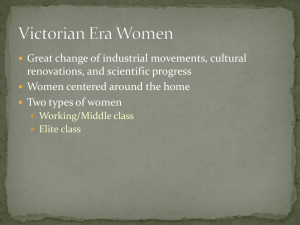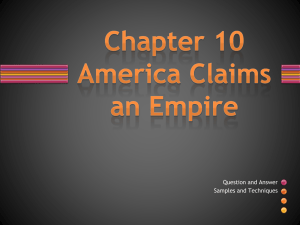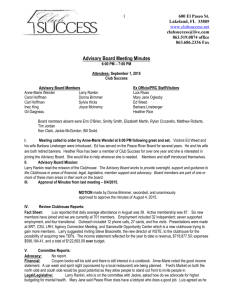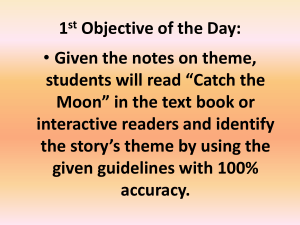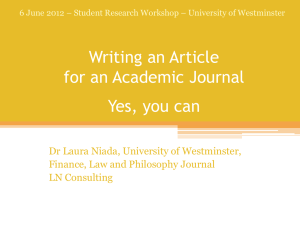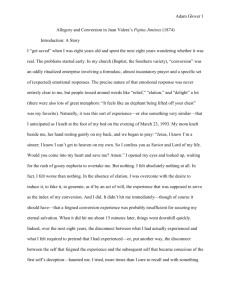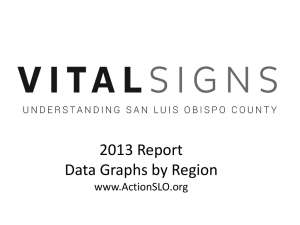第二册PPT课件Unit 5
advertisement
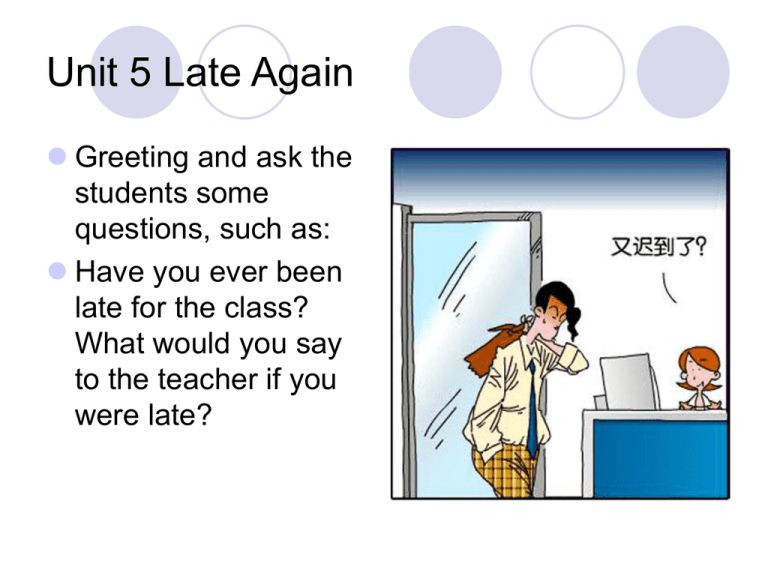
Unit 5 Late Again Greeting and ask the students some questions, such as: Have you ever been late for the class? What would you say to the teacher if you were late? Listen to the CD and then answer the questions: 1. Who was the woman calling to? Why did she call him? 2. What did the man say when he realized he forgot it? 3. Did the man know how to get there? What did the woman do then? Listening Script Luis: Hello. Luis Mendez. Laura: Luis, it’s Laura. Where are you? Luis: What do you mean, where am I? I’m here. I’m in the office. You’re talking to me. Laura: But we have a meeting with Lucid Systems, at one o’clock! Luis: At one? Oh, man! How do I get to Lucid? Laura: It’s on Ashby, 3121 Ashby, near Telegraph Avenue. Take College Avenue to Ashby, and turn right. Luis: Got it. Laura: Hurry! Luis: I’m on my way. Laura: Oh, Luis? Luis: Yeah? Laura: Be sure to bring the Lucid file. Luis: Where is it? Laura: I put it on your desk this morning. Luis: You did ? Laura: Remember? I put it next to your computer. Luis: Oh, right. Yeah, here it is. Laura: And Luis, please hurry. I need to talk to you about… Luis: Ok, we’ll talk about it when I get there. Bye. Further Study of the Vocabulary and Usage I. Man! 1. n. Man is frequently used in oral English to address someone, especially an adult male. It’s very casual use and usually used when the person you are talking to is your friend. E.g. That’s a great party, man! Hey, man! What’s up? We can know that man is used frequently in our life, for example, in many movies you can see that the word is often used as the film name. 2. Man is also used in spoken English to express certain kinds of emotions-excitement, surprise, and anger. Read the examples in our textbook. 3. Some short exclamations like Man: To express surprise: 1) Gosh! 2) Wow! 3) You’re kidding! When you make a mistake, say: Whoops! Express distaste for something: Yuck! Express taste for something: Yummy! Express pain: Ouch! Express that you like something: Mmm! Hurray! Some idioms with man a man of men 杰出的人 A man can do no more than he can. 人只能做力所能及的事。 A man cannot spin and reel at the same time. 一个人不能同时又纺又织; 一心不能二用。 No man is wise at all times. 智者千虑, 必有一失。 One man, no man. 个人的作用是有限的; 孤掌难鸣。 Further Study of the Vocabulary and Usage II. Avenue, street, road, high way, drive, etc. Avenue: streets in towns and cities. n.林荫道, 大街, 方法, 途径, 路 香榭丽舍大道 Avenue des Champs Elysées Road: streets that connect the suburban areas of a city. n. 路, 道路, 公路, 大道 Bird's-eye view of Hangzhou City. You can see many roads below: Street:街, 街道,街区 Downing street (伦敦的)唐宁街(英国首相官邸及若干政 府主要部门的所在地) Wall Street [美]华尔街(纽约金 融中心) “Wall Street, in New York City, means the stock market and ‘big money’.”“华尔街在 纽约市,它意味着证 券市场和‘巨富’。” Drive: the roads in neighborhoods. 汽车道;马路;私用车道 Further Study of the Vocabulary and Usage III. On the way 1. on the way: traveling from one place to another.在 途中, 接近 e.g. My English is still learning on the way. 我的英语正在学习 中。 2. by the way:顺便说 说;顺便提起 e.g. By the way, what happened to the money? 顺便问一句,那笔钱 后来怎么样了? 3. No way!: impossible 不,不行 e.g. ----Will you help me do this? ----No way, man! 4. in a big way: very much 非常 5. have it both ways: 在两个敌对的意见或者 行动中得利, 6. All the way 1) the whole way:自始至终 He rushed all the way to the station only to miss the train.他一路冲往车站,结 果还是错过了火车。 2) completely: 完全地 I‘ll back you up all the way.我完全支持 你 I’m with you all the way on that issue. 3)from far away: 从远道而… e.g. “Now, ” said the compere, “this little girl has traveled all the way from Liverpool to sing to us tonight. So let‘s all give her a big hand.”节目主持人说:“今 天晚上,这个从利物浦远道而来的小姑娘将 为我们演唱,让我们热烈鼓掌欢迎她。” 4) A merry heart goes all the way. 【谚】心情愉快,万事顺利。 7. Way to go!: Well done! Do a good job! 8. Have a way with: has a special ability to do something 对…有办法 9. Pave the way for…: prepared for; got something ready. 10. In one’s way: stop or prevent sb. 挡道的,妨碍人的 Other words errand: 差事 I need to run some errands for my roommate.我要帮室友办事 to run into: to meet or to see, especially by chance偶然见到 specialty特产 You can buy a lot of specialties at the farmer’s market. pick up偶然得到 Oral work: How do I get there? Some samples on how to ask and answer the way: Dialogue 1: A: Excuse me, where is the nearest bank? B: There is one next to the post office round the corner. A: Thank you. Dialogue 2: A: Excuse me, is there a hotel nearby? B: The nearest one is about 10 minutes’ walk here. A: How can I get there? B: Just walk down this road and you’ll find it. It’s on the right side. B: Thanks a lot. Dialogue3: A: Can you tell me the way to the library? B: Sure. Turn left at the next crossing. A: Is it on Xinhua Street? B: Yes. You can’t miss it. Task: (Page 41: II) Look at the map and make some dialogues by imitating the samples in the textbook or the dialogues given above. Do it in pairs. Part B More Listening I. Telephone Call Voice: Thank you for calling the Civic Arena. The Civic Arena is located at 111 First Street. For directions, please press 1. If you’re coming from San Francisco, take Highway 101 to Highway 880 North, go one mile to First Street, exit at First Street, and turn right. The Civic Arena is at the corner of First Street and Montgomery Street. If you’re coming from Oakland, take Highway 880 South to First Street, exit at First Street, and turn left. The Civic Arena is at the corner of First Street and Montgomery Street. If you’re coming from Santa Cruz, take Highway 17 North to Highway 880. Exit at First Street. Turn right. The Civic Arena is at the corner of First Street and Montgomery Street. If you’re coming by train, get off at the Civic Arena Station, between San Carlos Street Station and City Center Station. The arena is two blocks east of the station. To repeat these instructions, press 2. To end this call, please hang up. II. Long Conversation & III Spot Dictation A: I really appreciate everything you’ve been doing for me. Would it be Ok if I cooked you dinner tonight? B: Oh, that would be really nice of you, thank you! A: I would love to. The problem is I’m not quite sure where the grocery store is, could you tell me how to get there? B: You know, it’s really easy, if you just go out to the main street that you came on, make a right out there, and then turn right, and go all the way down Willow until you get to Creyts Road, and then you’re gonna make a left on the Creyts Road, and then your Kroger Store, which is a great big grocery store, will be on your right. A: On my right. Ok, I was thinking about some desserts, do you know where a bakery… is there a bakery nearby? B: Yep, there is a fabulous bakery not… it’s just like a mile further down the road, in the same direction that you were going. A: Ok, just keep going. B: It will be on your left. A: On my left. B: Just keep going. A: And um, do you like a little wine dinner? B: Oh, I would love it. And you know what? There’s a liquor store, that’s just right across the street from the bakery. A: That will be great. B: So you can get everything right there. A: Ok, are you sure? I’m not very good at finding my way around town. Are you sure I can get to… B: It’s really simple, all you have to do is when… after you’ve finished with everything, just turn yourself around and go all the way until you get to Willow again. A: Ok, that doesn’t sound too hard. Cool. IV. Short Passage Many men are proud of their sense of direction which, according to many reports, is much better than that of women’s. my father is one of the scarce exceptions. He is the type of person who seldom knows where he is in relation to where he is going. That is why we were almost shocked to death when my father announced one day that he was going to buy a car and was learning to drive. He managed to become a driver, but was never allowed to drive alone until one day there came a chance when nobody could go with him together. We had to draw an extremely detailed map for him, involving everything that could ever help him recognize the places where he was going to. Confidently he left. Though expected to come back at four, he entered the house at eight. “Did you get lost? Didn’t the map help?” A mountain of questions followed before my father could at last answer, “I arrived there quite easily as a matter of fact,” said he, “But I got lost in the building and failed to find my way out of it. I spent quite a while there and got out at last with the help of a clerk. And then I found that it wasn’t the entrance I formerly went into, so I couldn’t find the parking lot where I parked the car.” this was really beyond our prediction. Then my mother asked, “How did you find it at last?” “Not yet,” said my father, “ I took a taxi and came back.”
